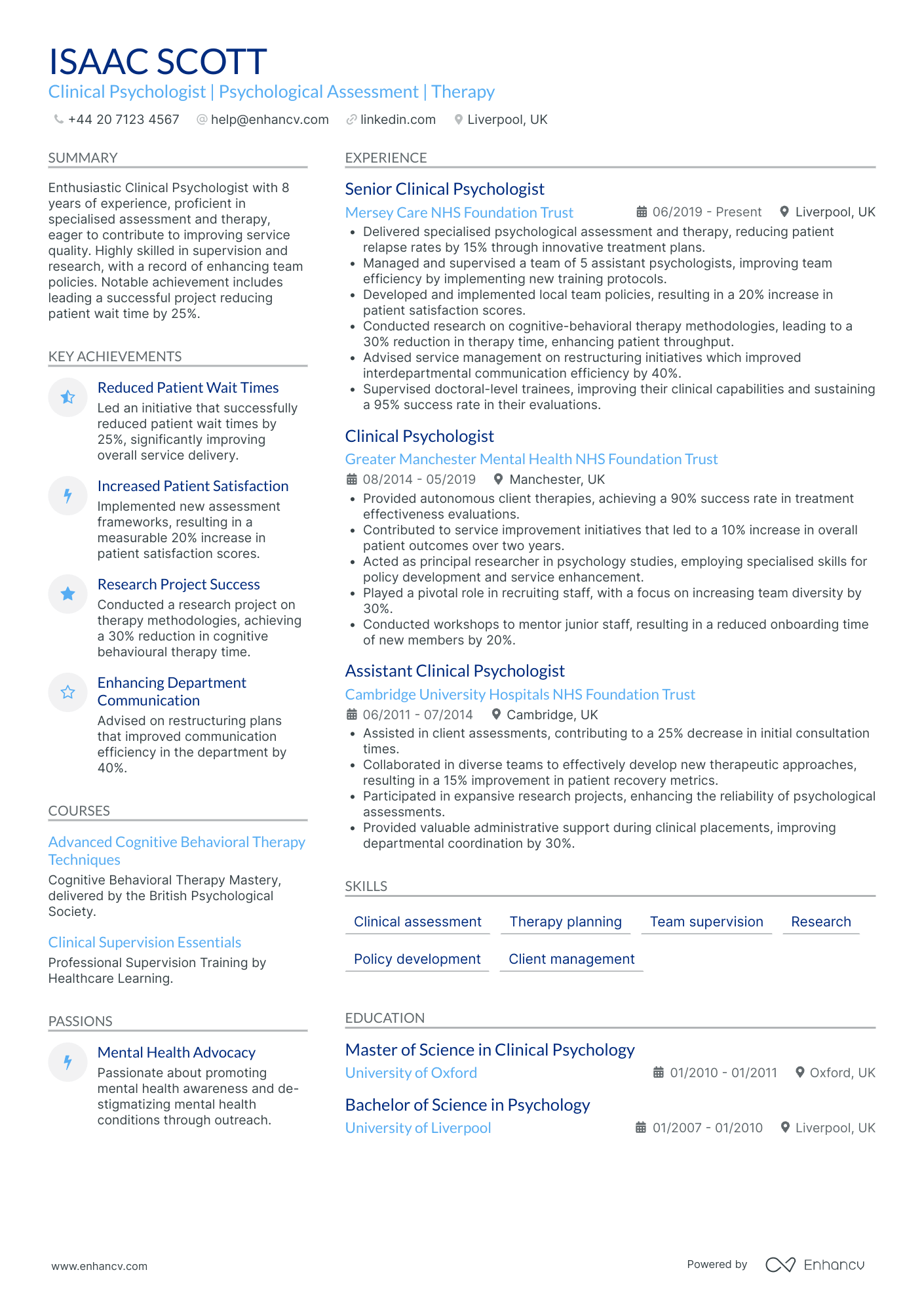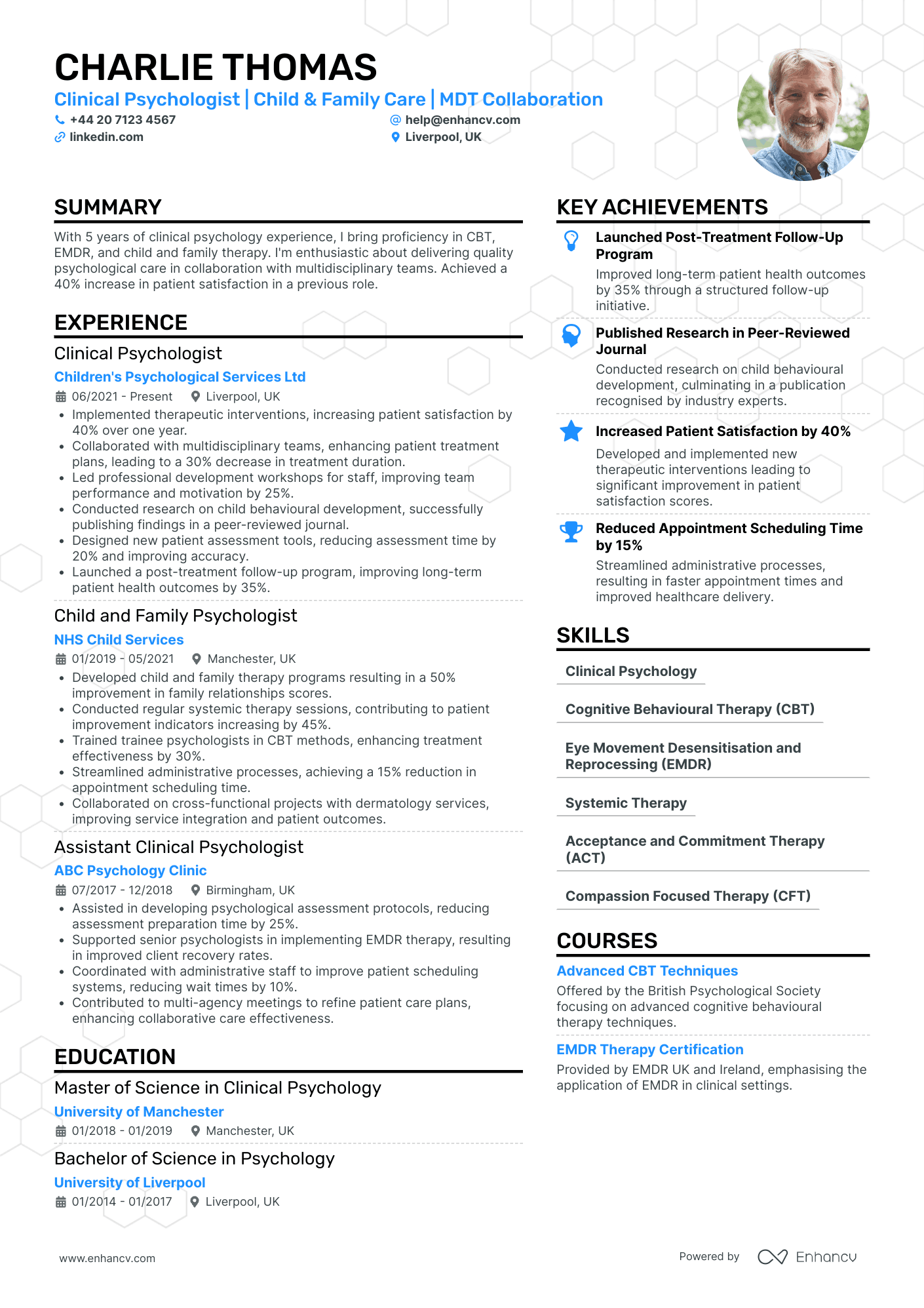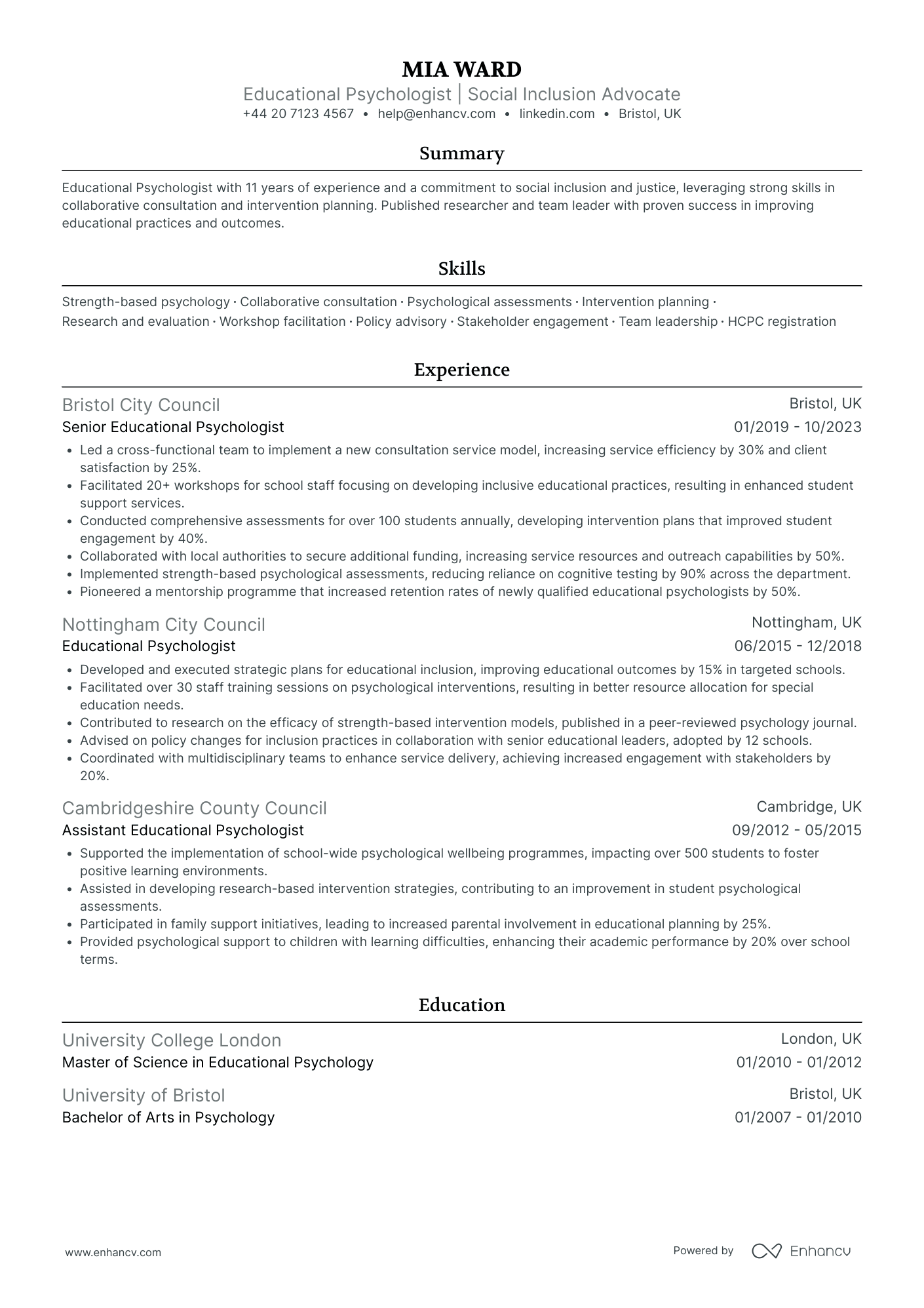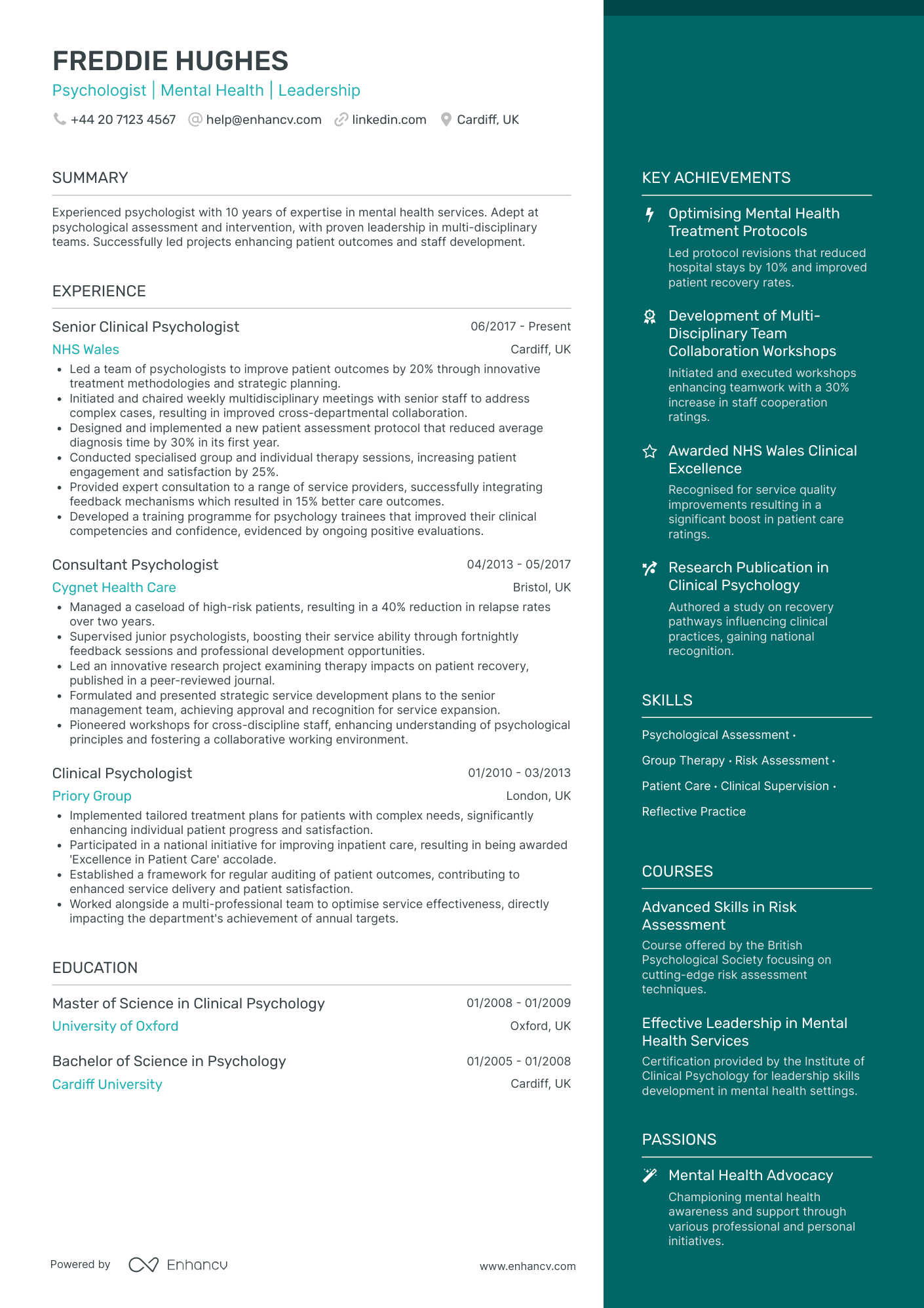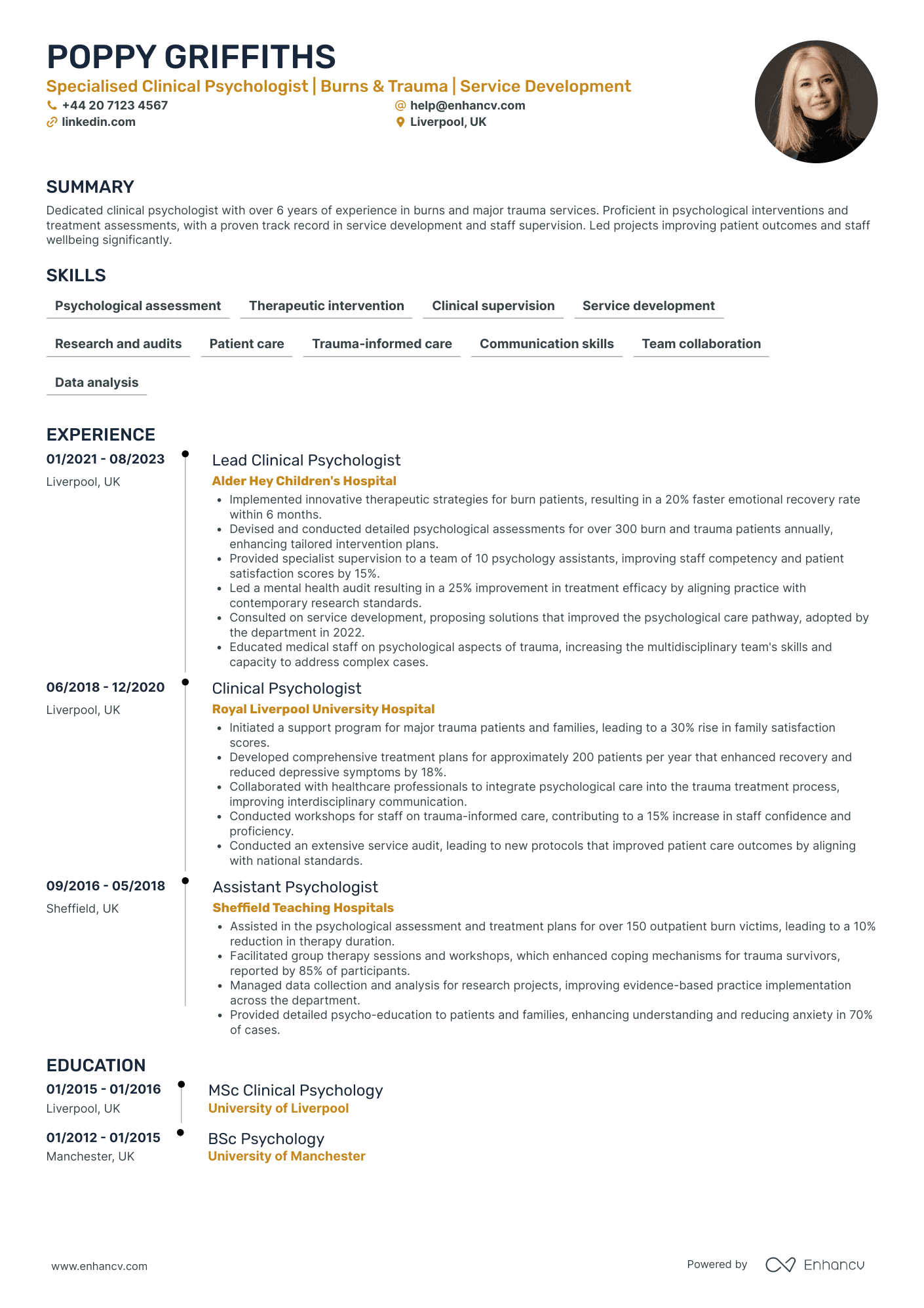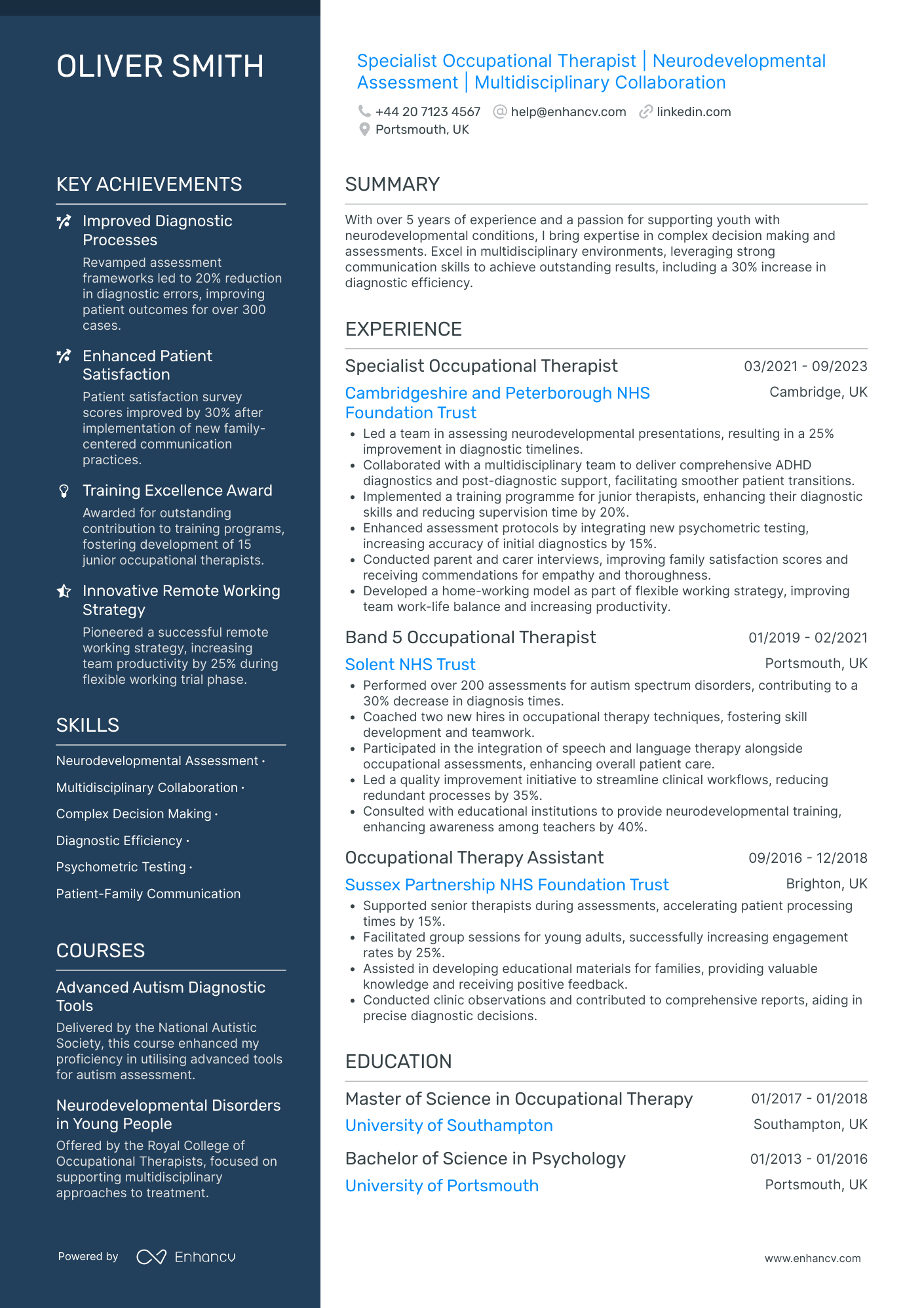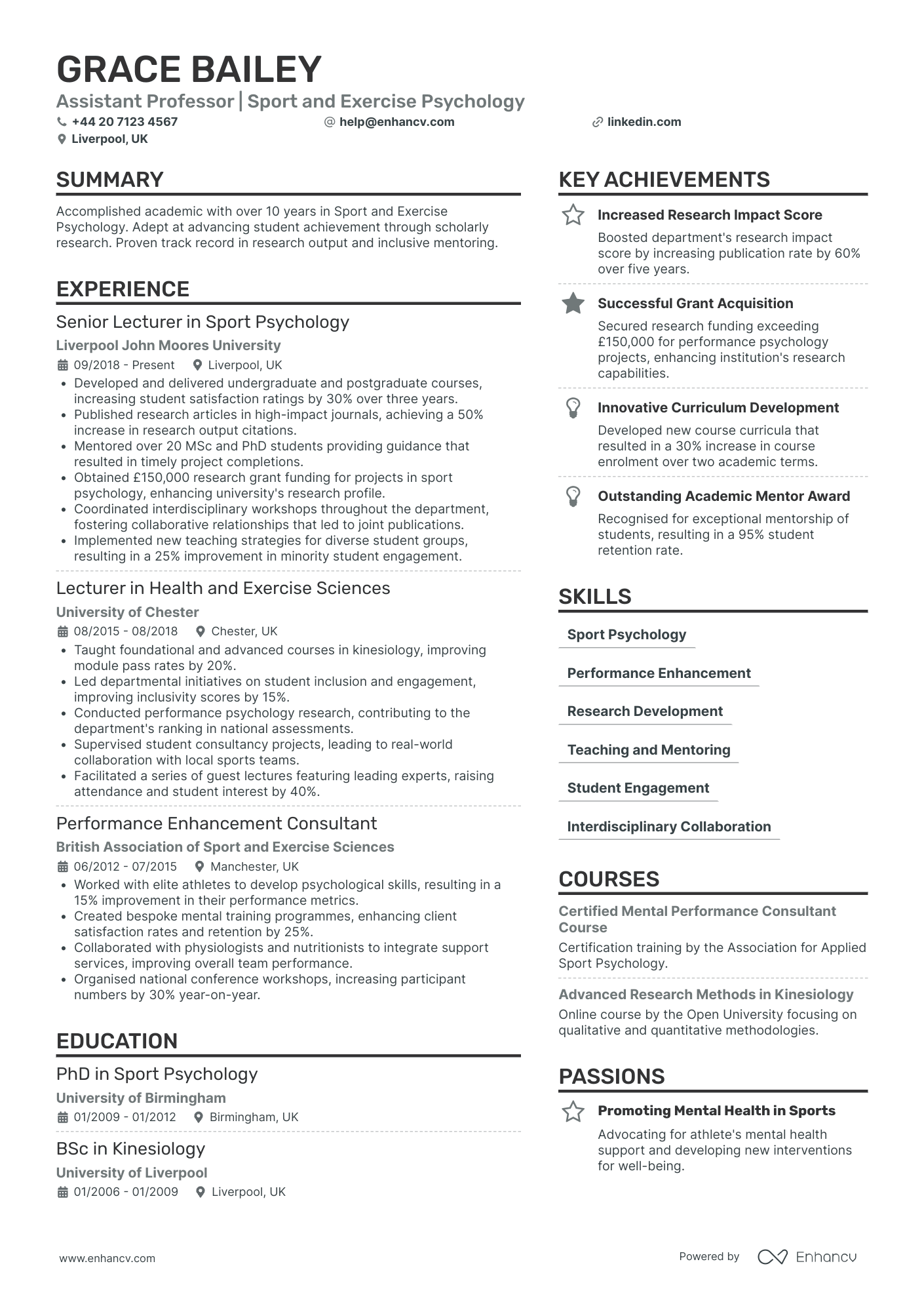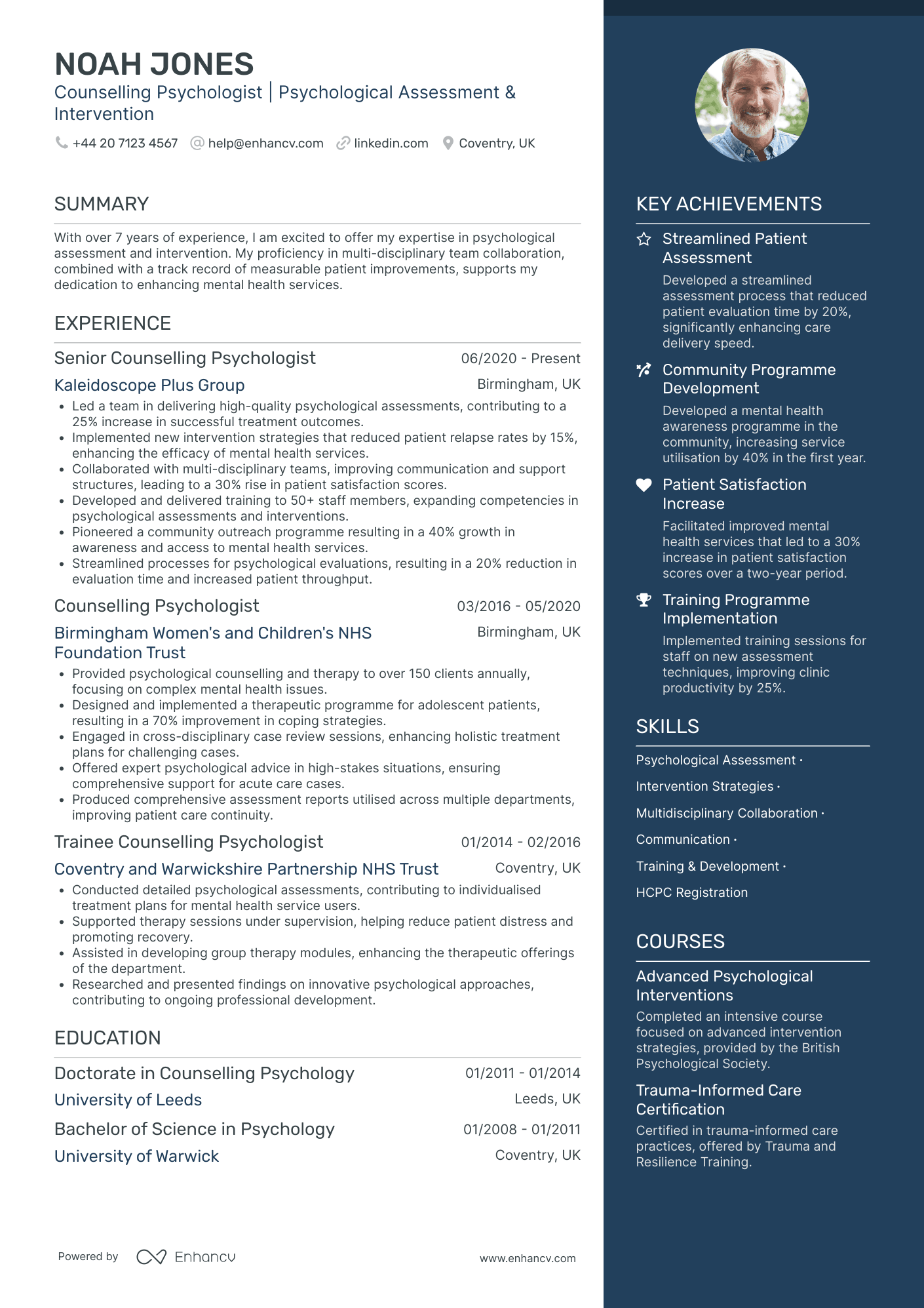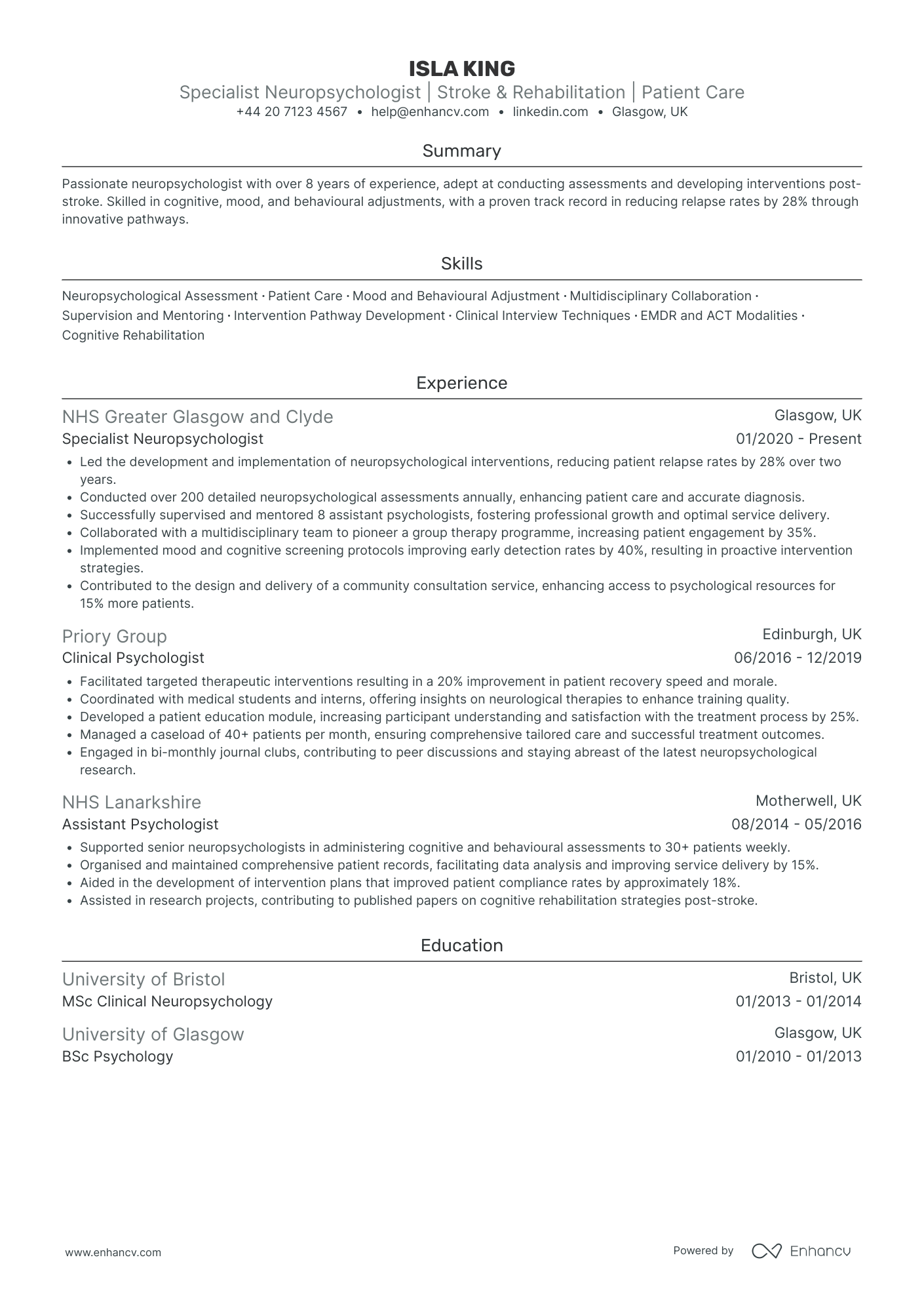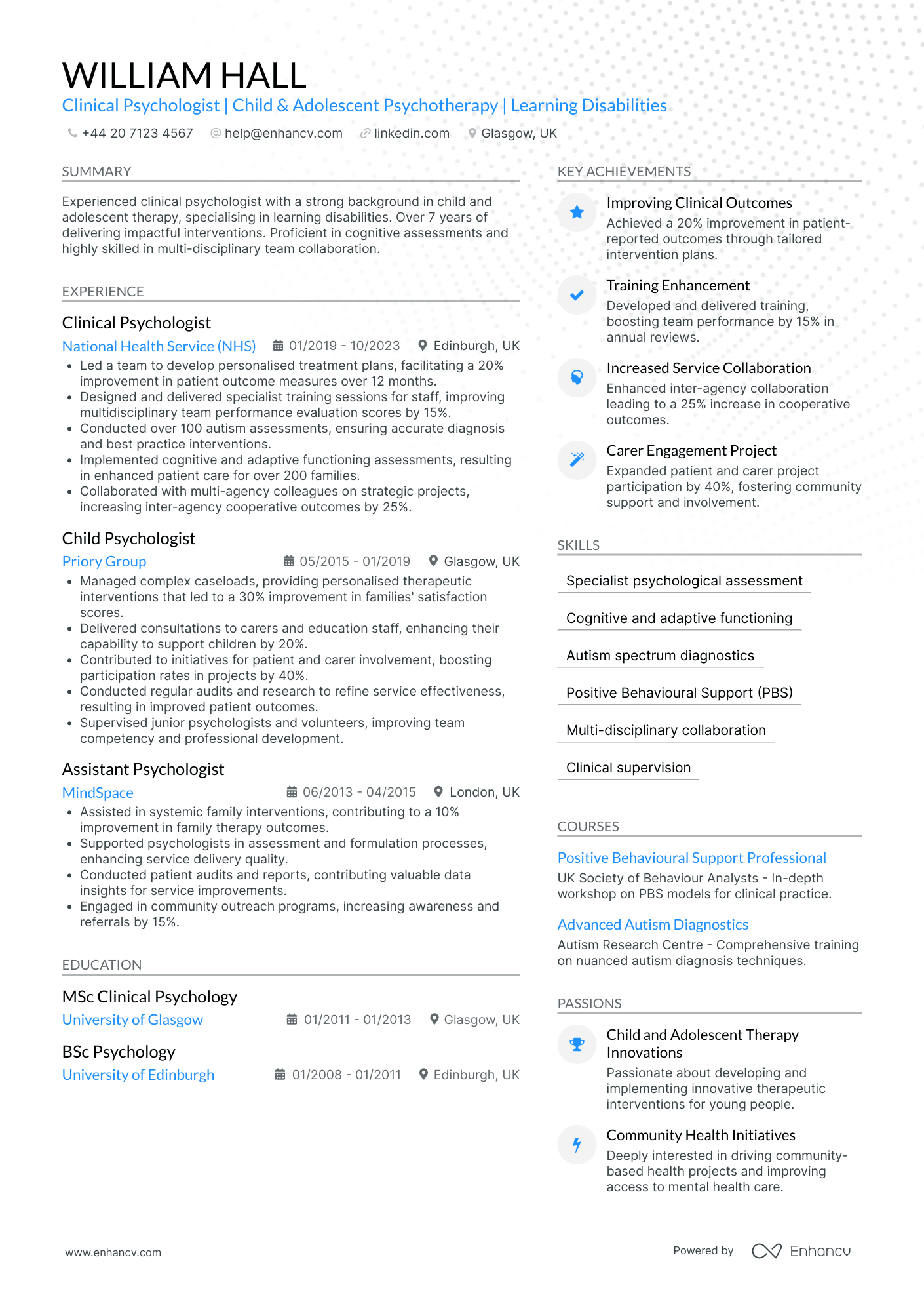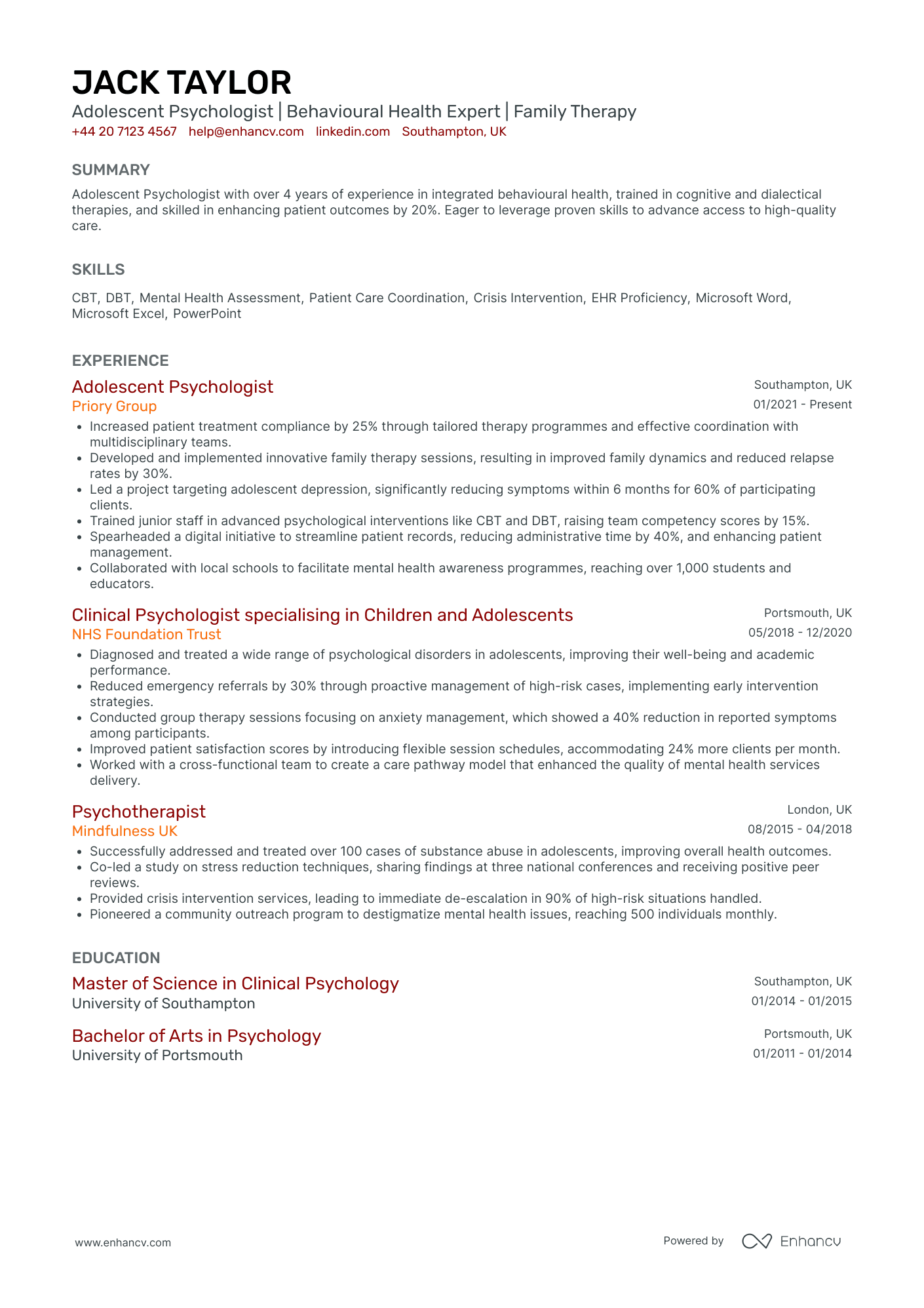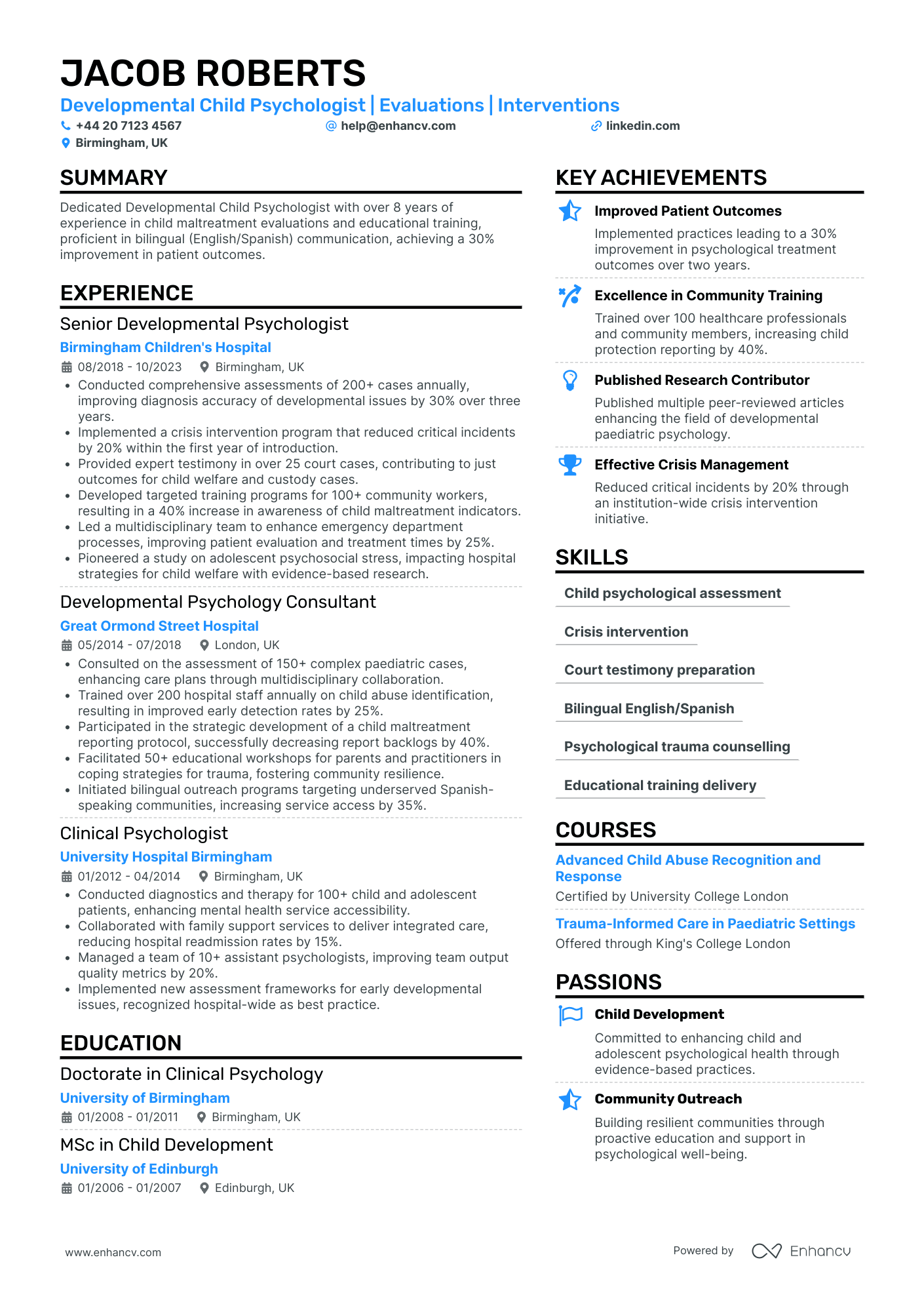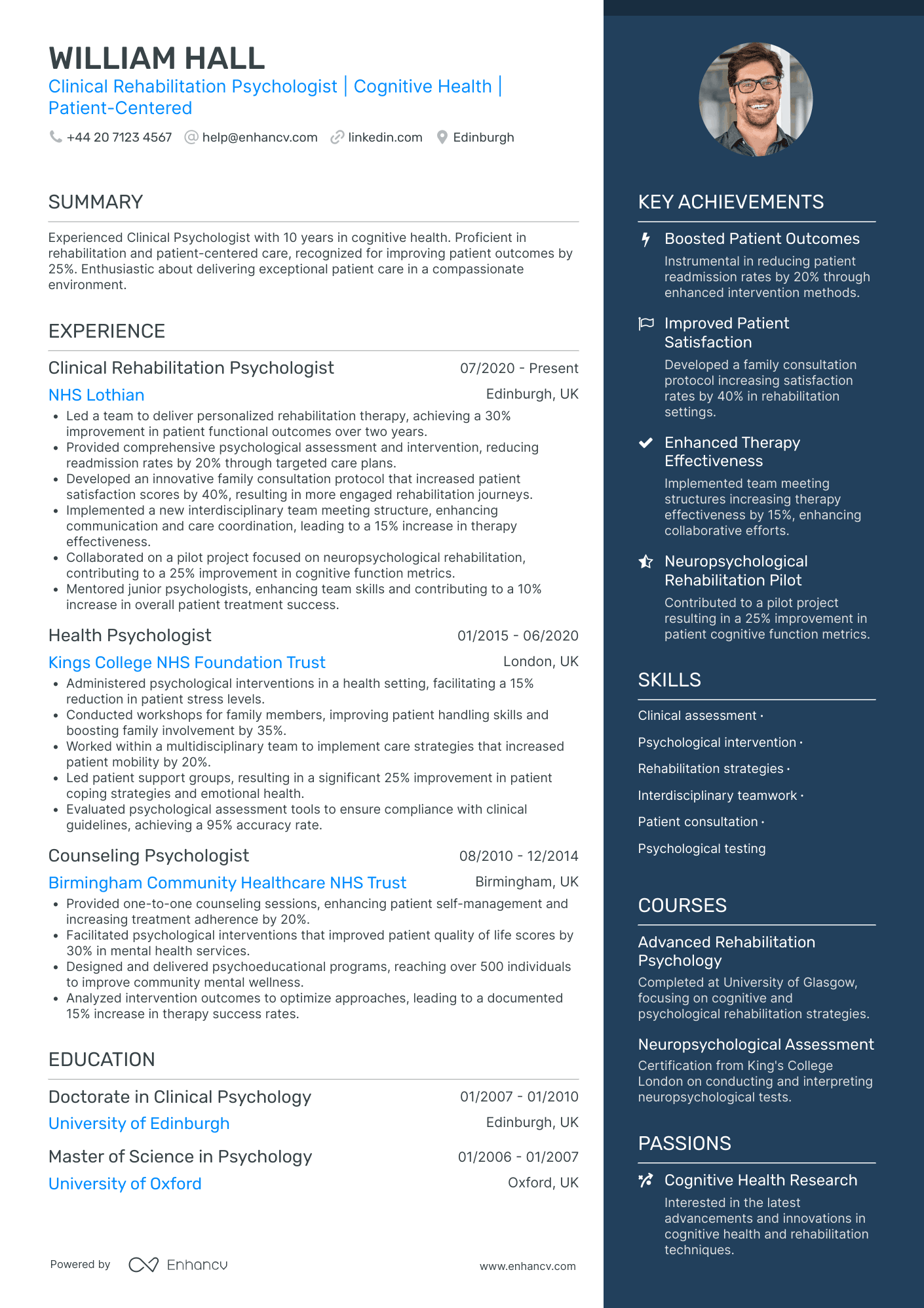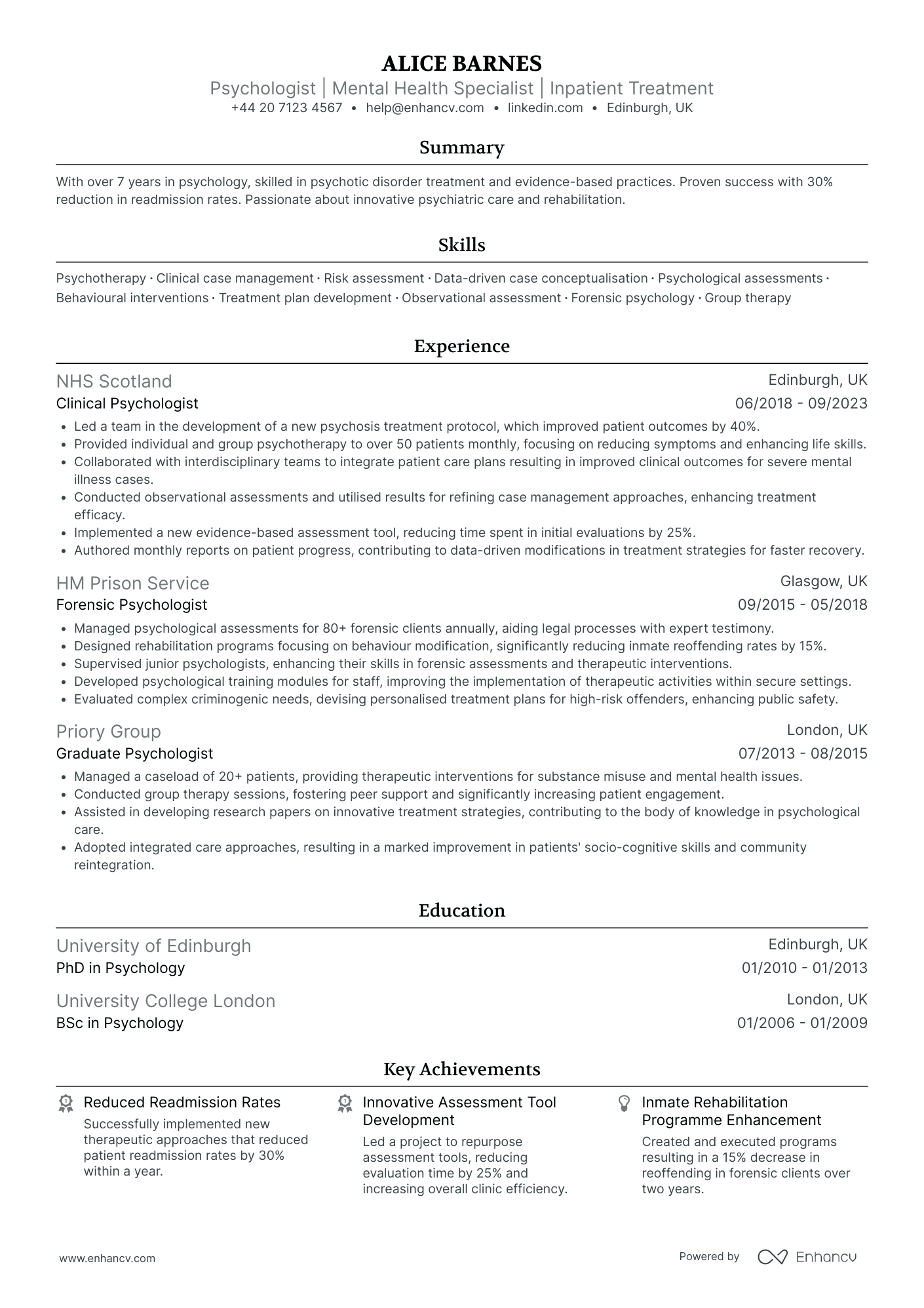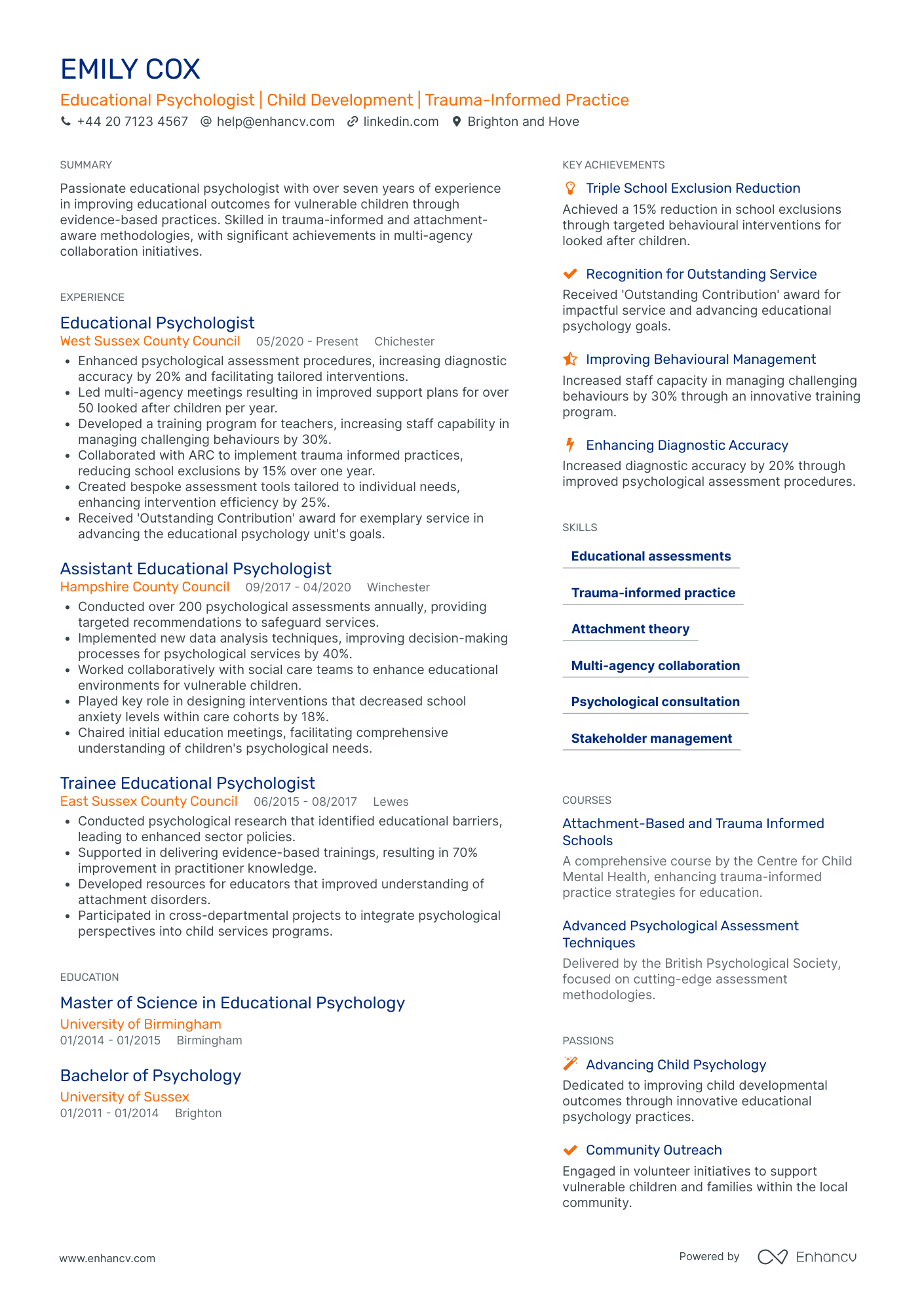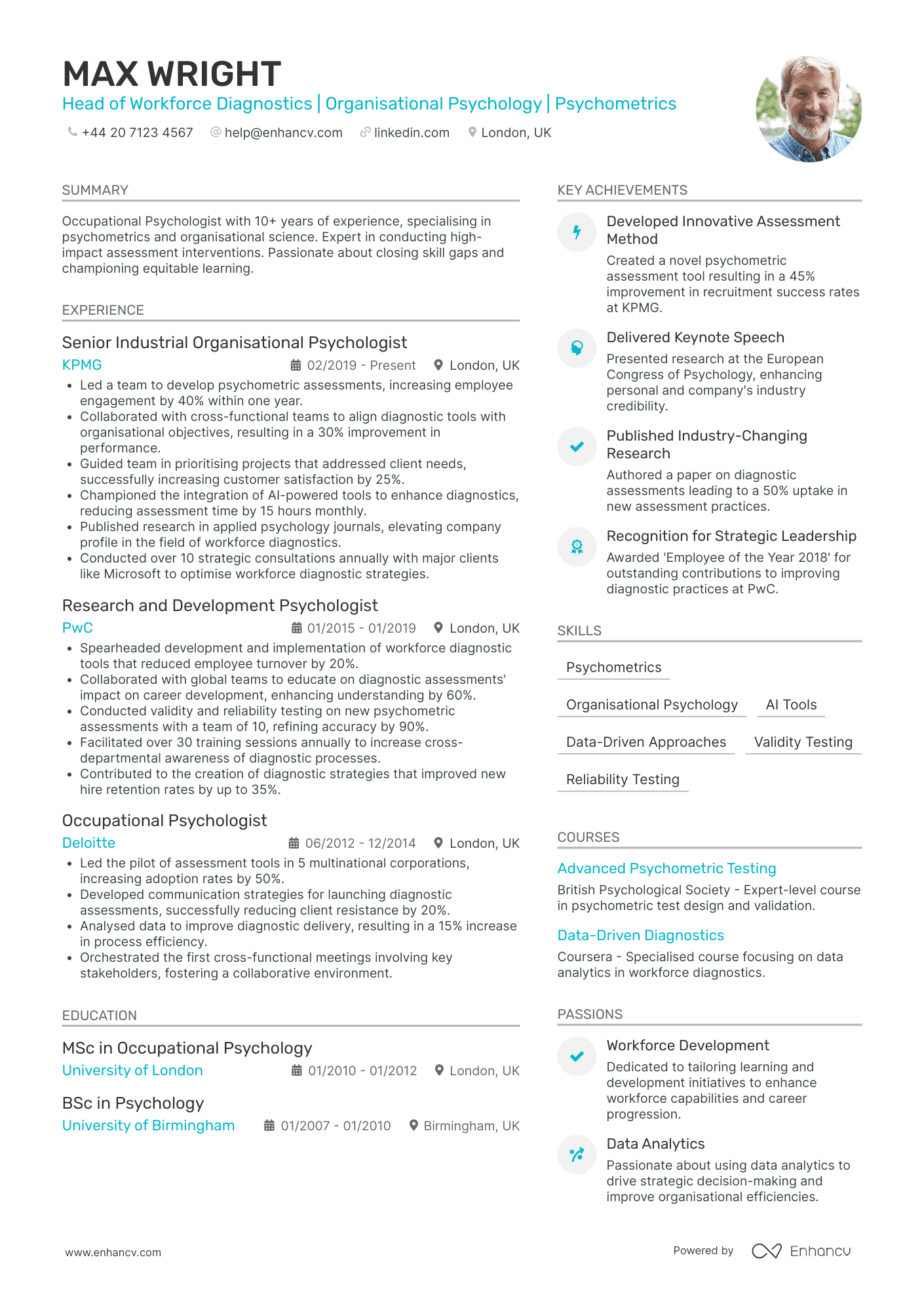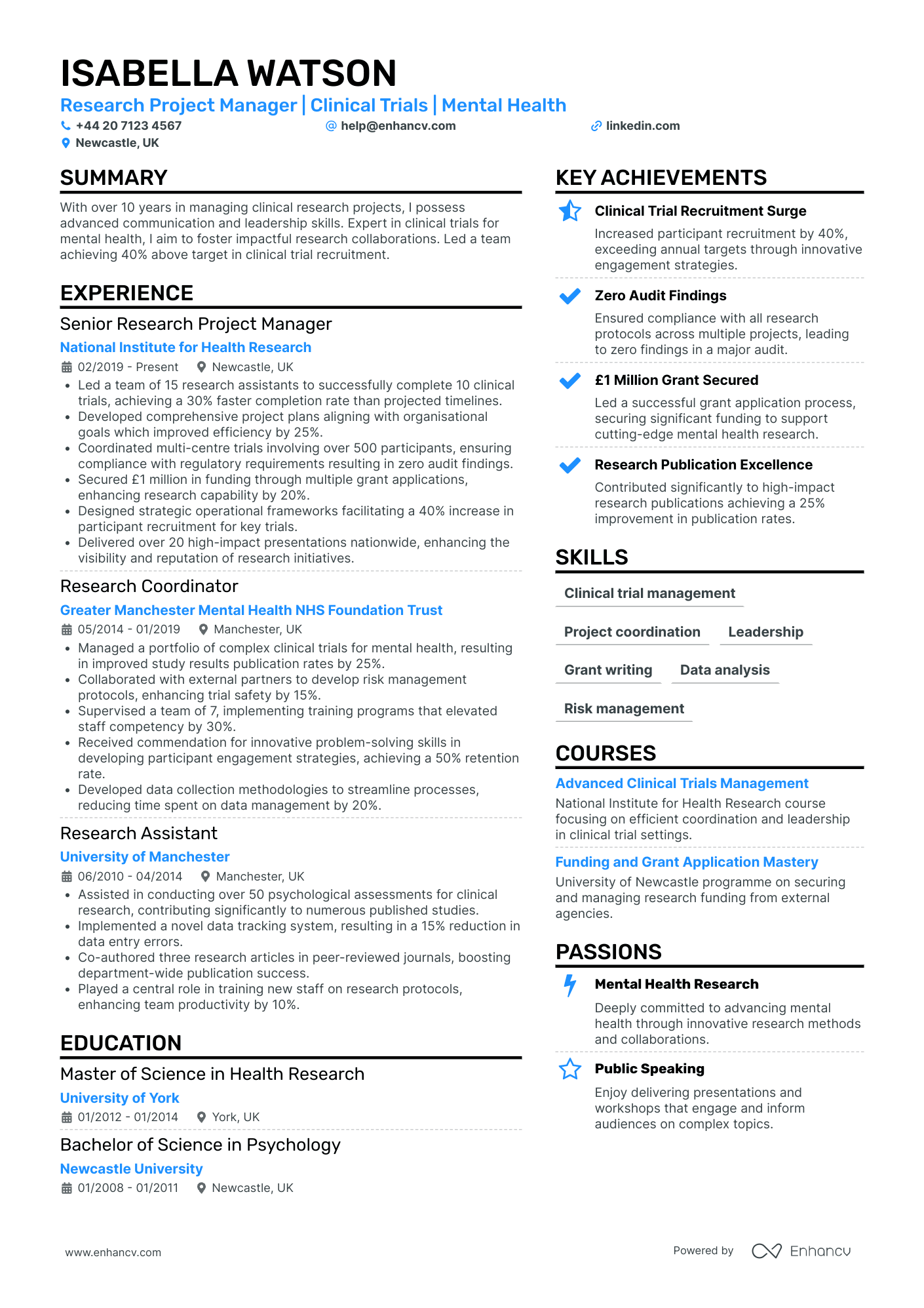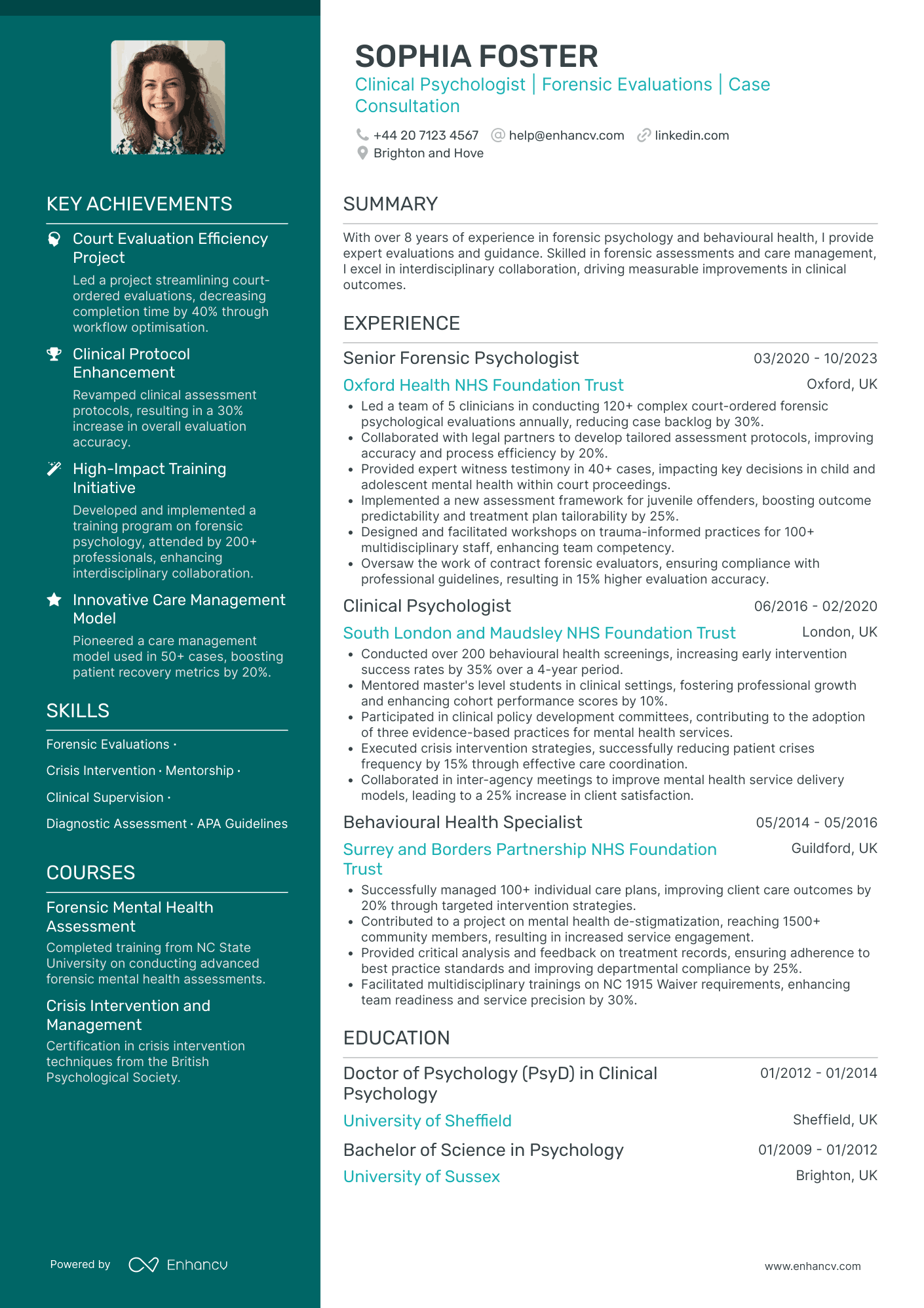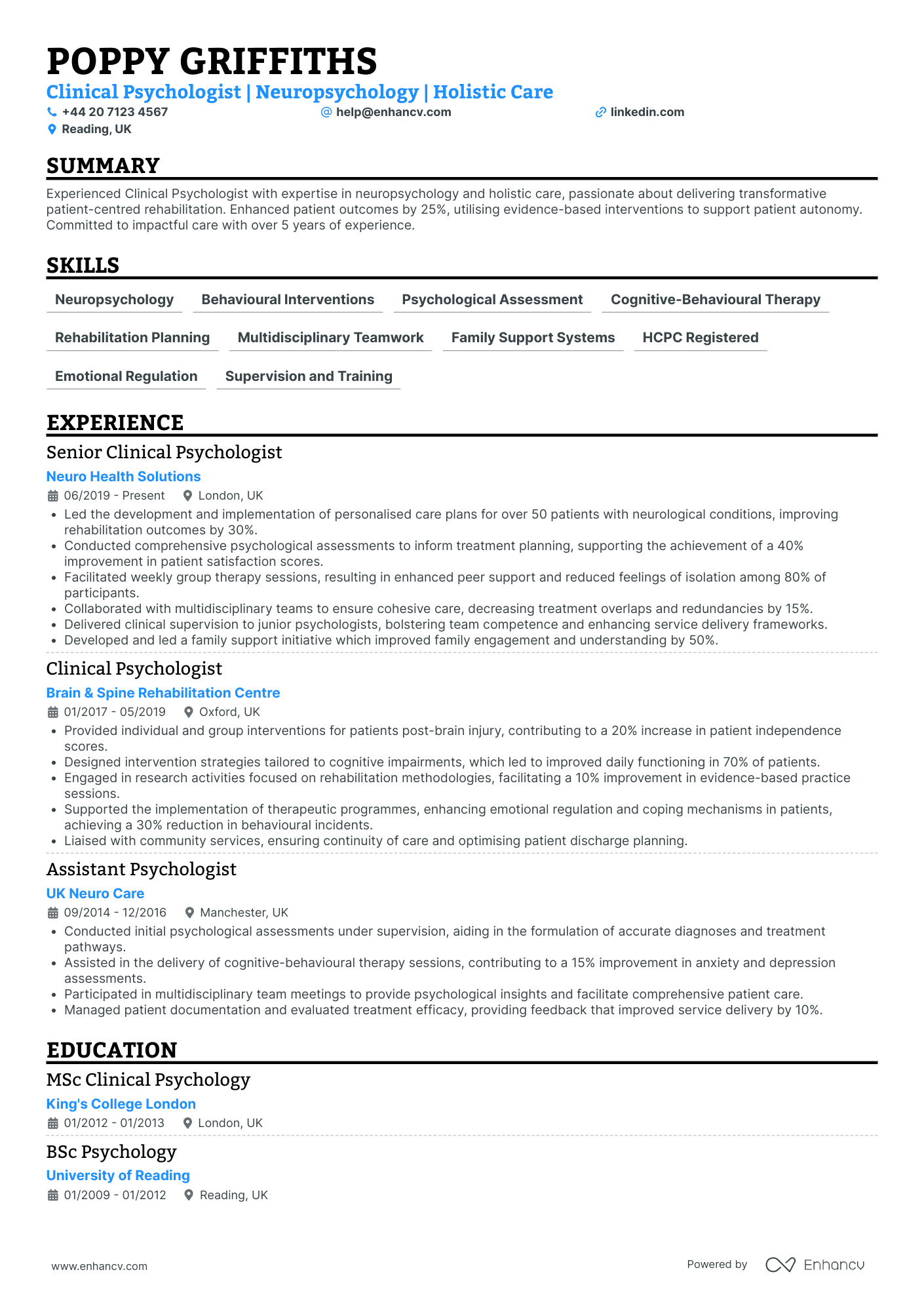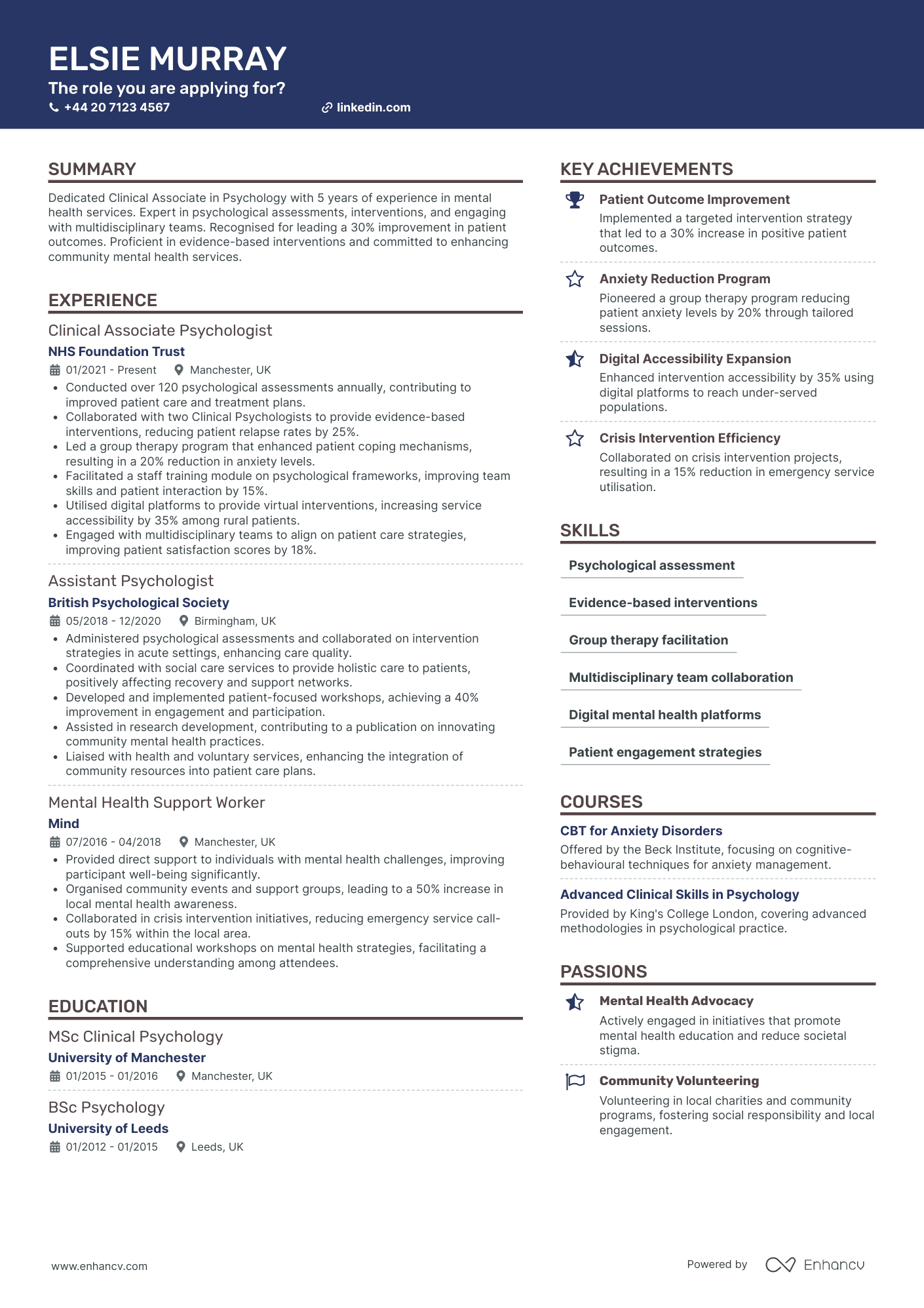Navigating the complex terrain of therapeutic approach diversity is a CV challenge that many psychologists encounter. Our guide provides you with the tools to effectively distil your diverse skill set into a compelling CV that stands out to potential employers or clients.
- Design and format your professional psychologist CV;
- Curate your key contact information, skills, and achievements throughout your CV sections;
- Ensure your profile stays competitive by studying other industry-leading psychologist CVs;
- Create a great CV even if you happen to have less professional experience, or switching fields.
When writing your psychologist CV, you may need plenty of insights from hiring managers. We have prepared industry-leading advice in the form of our relevant CV guides.
Resume examples for psychologist
By Experience
Senior Clinical Psychologist
- Clear and Concise Content Presentation - The CV is well-structured with each section clearly delineated, allowing a hiring manager to quickly access key information. The use of bullet points in the experience section enhances readability and ensures that major achievements and responsibilities stand out without overwhelming the reader with large blocks of text.
- Progressive Career Trajectory - Isaac's career shows a strong trajectory of growth from an Assistant Clinical Psychologist to a Senior Clinical Psychologist. Along the way, he took on increasing levels of responsibility, culminating in a management position where he leads a team and impacts organizational policies. This progression indicates not only career advancements but a growing breadth of skills and leadership ability.
- Industry-Specific Achievements with Impact - The CV goes beyond listing duties to highlight tangible achievements, such as reducing patient wait times by 25% and relapse rates by 15%. These statistics aren't just numbers; they illustrate a positive impact on healthcare service delivery, emphasizing Isaac's ability to implement impactful solutions that enhance patient care and operational efficiency.
By Role
Clinical Psychologist
- Clear and Well-Structured Presentation - The CV is clearly structured with distinct sections such as experience, education, skills, and achievements, ensuring easy readability and navigation. Each section is concise, providing essential information without overwhelming detail, which enhances clarity and focus.
- Demonstration of Career Progression - From an Assistant Clinical Psychologist role to a Clinical Psychologist position in prominent institutions, Charlie demonstrates a clear career trajectory. This progression is indicative of professional growth and increased responsibilities, reflecting commitment and expertise within the field of clinical psychology.
- Impactful Achievements with Business Relevance - Achievements are presented with specific metrics that highlight concrete business impacts, such as a 40% increase in patient satisfaction and a 30% decrease in treatment duration. These accomplishments not only demonstrate professional success but also emphasize their relevance to improving healthcare outcomes.
Educational Psychologist
- Comprehensive and Structured Content Presentation - The CV is well-organized, beginning with an insightful summary that encapsulates Mia Ward's experience and focus on social inclusion. Clear headings for experience, education, skills, courses, and languages ensure easy navigation, allowing potential employers to quickly identify her strengths and qualifications.
- Dynamic Career Growth and Consistent Promotions - The progression from Assistant Educational Psychologist to Senior Educational Psychologist demonstrates her career advancement and the trust within the organizations she worked for. This trajectory indicates a continuous growth in both responsibilities and expertise, underscoring her ability to excel in increasingly complex roles.
- Achievements with Significant Business Impact - The CV highlights key accomplishments such as redesigning consultation service models that resulted in significant efficiency improvements and increased client satisfaction. These achievements are not only quantified but also articulated with their positive impact on the communities and systems she served, reinforcing the value she brings to an organization.
Forensic Psychologist
- Comprehensive Career Progression - Freddie Hughes's CV reflects a clear and steady career trajectory, showcasing progressive roles within the mental health services sector. Each position displays increased responsibility, from Clinical Psychologist to Senior Clinical Psychologist, highlighting Hughes's professional growth and leadership in psychological care.
- Impactful Leadership and Collaboration - The CV emphasizes Hughes's ability to lead and inspire multidisciplinary teams, fostering collaboration that has significantly enhanced patient outcomes and staff cooperation. Notably, Hughes’s leadership in initiating multidisciplinary team workshops resulted in a 30% increase in staff cooperation ratings, pointing to strong skills in teamwork facilitation.
- Innovative Methodologies and Industry Contributions - Unique to Hughes's background is the emphasis on innovation in mental health treatment methodologies and patient assessment protocols. Implementing new systems that reduced diagnosis times by 30% and led impactful research underscore Hughes's technical depth and commitment to advancing clinical psychology practices.
Health Psychologist
- Well-structured and insightful content presentation - The CV is organized with clarity and precision, providing a coherent narrative of Poppy Griffiths’ professional journey. Each section is concise yet comprehensive, ensuring that key details are easily accessible without overwhelming the reader. The emphasis on specific achievements in each role demonstrates a strong alignment between Poppy’s expertise and her career focus on burns and trauma psychology.
- Impressive career trajectory with a focus on specialized clinical practice - Poppy Griffiths' career progression from an Assistant Psychologist to Lead Clinical Psychologist underscores her growth and dedication to her field. Her advancement aligns with increased responsibilities and leadership roles, particularly in major healthcare institutions. This trajectory highlights her ability to ascend within her specialty and take on pivotal roles in improving patient care and service delivery.
- Commitment to enhancing service outcomes through innovative methodologies - Poppy’s experience shows a strong commitment to improving patient outcomes through the adoption of innovative strategies in psychological care. She has led initiatives that resulted in significant improvements in recovery rates and treatment efficacy, showcasing her ability to apply cutting-edge research and methodologies to real-world clinical settings. Her use of audits and data to drive service improvements is a standout feature that reflects her technical depth and focus on evidence-based practice.
Occupational Psychologist
- Clear and Structured Presentation - This CV is structured in a coherent manner, beginning with the personal summary, followed by detailed sections on experience, education, skills, and achievements. The use of bullet points under each job title allows for quick reading and comprehension, making it easy for recruiters to identify key competencies and achievements.
- Career Growth in the Healthcare Sector - Starting as an Occupational Therapy Assistant and advancing to a Specialist Occupational Therapist showcases a defined upward trajectory. This progression highlights the candidate's ability to take on increasing responsibilities and foster expertise in neurodevelopmental assessment and multidisciplinary collaboration, essential skills for advancing in the healthcare industry.
- Impactful Achievements Tied to Patient Outcomes - The CV doesn’t just list numbers; it links achievements to meaningful healthcare outcomes. A 25% increase in diagnostic timelines and improvements in patient satisfaction highlight the candidate's commitment to enhancing diagnostic processes and patient care, directly correlating to better healthcare service delivery.
Sport and Exercise Psychologist
- Structured Content with Clear Emphasis - The CV is meticulously organized, starting with a concise summary that outlines key competencies and achievements. Each section is clearly defined, allowing for easy navigation through the candidate's educational background, professional experience, skills, and passions.
- Progressive Career Trajectory in Academia - Grace Bailey's career highlights a steady progression from a Lecturer to a Senior Lecturer, showcasing her growth within the academic domain of Sport and Exercise Psychology. The trajectory reflects an increasing level of responsibility and impact, from advancing student inclusivity to securing substantial research funding.
- Cross-Disciplinary Methodologies and Collaboration - The CV emphasizes the candidate's expertise in interdisciplinary collaboration, especially through the establishment of joint publications and workshops. This adoption of diverse methodologies not only contributes to her research impact but also enhances the educational experience she provides to her students.
Counselling Psychologist
- Professional Growth and Leadership - Noah Jones demonstrates steady professional growth, transitioning from a trainee role to a senior leadership position. His role as a Senior Counselling Psychologist encapsulates his leadership capabilities by leading teams, developing training programs, and initiating community outreach, affirming his upward career trajectory within the mental health sector.
- Diverse and Collaborative Experience - The CV underlines Noah's adaptability through his experience in various healthcare settings, ranging from NHS trusts to mental health organizations, showcasing his ability to effectively integrate into different environments. His emphasis on multidisciplinary collaboration further highlights his cross-functional capability and the importance of communication and teamwork in enhancing patient care outcomes.
- Impact of Achievements in Mental Health Services - Noah’s accomplishments are not just numerical but deeply impactful for the business aspect of mental health services. For example, the implementation of intervention strategies and community programs not only improved treatment outcome rates and patient satisfaction but also expanded access to mental health services, demonstrating the broad influence of his work on service improvement and community health awareness.
Neuropsychologist
- Detailed Career Growth and Specialization - Isla King's CV effectively outlines her career progression, highlighting her advancement from an Assistant Psychologist to a Specialist Neuropsychologist. This trajectory demonstrates her deepening expertise and commitment to her field, particularly in stroke and rehabilitation. Her roles show a clear progression of responsibilities and achievements, underscoring her industry dedication and the value she has consistently brought to her roles.
- Emphasis on Achievements with Tangible Impact - The CV provides impressive evidence of Isla's impact through quantifiable accomplishments, such as reducing patient relapse rates by 28% and improving early detection of mood disorders by 40%. By illustrating these concrete outcomes, the CV not only highlights Isla's ability to implement effective interventions and strategies but also showcases her capability to drive significant improvements in patient care and service delivery.
- Inclusion of Diverse Skills and Methodologies - Isla's CV is enriched with references to specialized tools and methodologies, including EMDR and ACT modalities, which are crucial in the neuropsychological field. Her diverse skills in neuropsychological assessments, patient care, and multidisciplinary collaboration emphasize her comprehensive competency. Additionally, her commitment to continuous learning is reflected in her advanced courses and certifications, adding depth to her technical knowledge and application in real-world settings.
Child Psychologist
- Clear structure with focus on key competencies - The CV is well-organized, leading with an informative header and a succinct summary that highlights William's specialization in child and adolescent therapy and learning disabilities. The sections are logically structured, allowing for easy navigation through his experiences, education, skills, and achievements.
- Demonstrated career growth and specialization - William’s career trajectory illustrates steady growth from an Assistant Psychologist to a clinical leader role within the NHS. His promotions and role transitions reflect a deepening specialization in child and adolescent psychotherapy and learning disability interventions, showcasing progressive responsibility and expertise.
- Industry-specific innovation and collaboration - The CV underscores unique elements like developing personalised treatment plans and implementing multidisciplinary initiatives. William's involvement in designing autism diagnostics and PBS workshops demonstrates his technical depth and commitment to innovative methodologies in psychological services.
Adolescent Psychologist
- Clear and Structured Content Presentation - The CV is well-organized and concise, making it easy to extract key information quickly. Each section is clearly labeled, and the use of bullet points under experience facilitates a quick understanding of the candidate's responsibilities and achievements. This clarity enhances the CV's effectiveness, especially in highlighting the candidate's expertise in adolescent psychology and family therapy.
- Progressive Career Trajectory and Industry Expertise - Jack Taylor’s career path reflects significant growth within the field of psychology. Starting as a Psychotherapist, he has advanced to more specialized roles like Clinical Psychologist and Adolescent Psychologist. This progression is indicative of both personal development and an increasing level of responsibility and influence in his roles, showcasing a deepening expertise in adolescent and behavioral health.
- Quantifiable Achievements with Business Relevance - The CV effectively incorporates achievements with measurable impacts, such as increasing patient treatment compliance by 25% and reducing relapse rates by 30% through family therapy. These accomplishments are not merely numerical; they highlight significant contributions to patient care improvements and service efficiency, underscoring the candidate's ability to create meaningful changes within healthcare settings.
Developmental Psychologist
- Clear and Structured Presentation - The CV presents information in a clear and structured manner, using well-organized sections such as experience, education, skills, and achievements. Each section is concise, allowing the reader to quickly grasp the candidate's qualifications and professional background, enhancing readability and retention.
- Strong Career Trajectory and Growth - Jacob Roberts's career trajectory demonstrates significant growth, moving from a Clinical Psychologist at University Hospital Birmingham to a Senior Developmental Psychologist at Birmingham Children's Hospital in just a few years. This progression highlights his expanding responsibilities and influence in the field of developmental psychology.
- Achievements with Real Impact - The CV effectively showcases Jacob's substantive achievements, such as a 30% improvement in diagnostic accuracy and a 20% reduction in critical incidents through crisis intervention programs. These accomplishments reflect his ability to drive meaningful improvements in healthcare settings, emphasizing his value to potential employers.
Rehabilitation Psychologist
- Clear and Structured Presentation - The CV excels in clarity and structure, with each section clearly defined, facilitating easy navigation for readers. The use of bullet points under each role succinctly captures the candidate's responsibilities and achievements, ensuring conciseness without sacrificing detail.
- Career Growth and Consistent Industry Commitment - William Hall's career trajectory demonstrates a solid growth path within the field of clinical psychology, moving from a Counseling Psychologist to a Clinical Rehabilitation Psychologist. This upward progression not only showcases increasing responsibility but also a deepened specialization in cognitive health and rehabilitation.
- Highlighting Leadership and Mentorship Capabilities - The CV emphasizes Hall’s leadership skills, such as leading a team to achieve a notable 30% improvement in outcomes and mentoring junior psychologists to elevate team performance. These elements underscore his capability not only as a practitioner but also as a leader who enhances team dynamics and patient results.
Social Psychologist
- Strong focus on therapeutic innovations - The CV highlights Alice Barnes' commitment to innovative psychiatric care by detailing her involvement in developing a new psychosis treatment protocol and evidence-based assessment tools. These innovations demonstrate her ability to drive significant improvements in patient outcomes, such as a 40% improvement rate and a 25% reduction in evaluation time.
- Extensive experience in both clinical and forensic settings - Alice Barnes has a well-rounded career trajectory, exhibiting seamless transitions between different roles within psychology. Starting as a Graduate Psychologist, she advanced to positions in both clinical and forensic settings, which showcases her adaptability and comprehensive understanding of complex psychological cases across various environments, from hospitals to prisons.
- Leadership and development of interdisciplinary teams - The CV emphasizes Alice Barnes' leadership capabilities by underscoring her role in supervising junior psychologists and leading training modules for staff. Her ability to collaborate with and enhance interdisciplinary teams has led to improved clinical outcomes, highlighting her skill in integrating diverse expertise to better patient care.
School Psychologist
- Clarity and Structure of Presentation - The CV is organized with section headers that clearly define each part of Emily Cox's professional history. This clarity allows easy navigation, enabling readers to quickly understand the candidate's qualifications and experience. Each role includes concise bullet points, detailing responsibilities and achievements, ensuring the main points stand out without overwhelming the reader.
- Career Growth and Industry Commitment - Emily Cox's career trajectory demonstrates a natural progression within educational psychology. Starting as a Trainee Educational Psychologist and advancing to an Educational Psychologist at West Sussex County Council, she has consistently taken on increased responsibilities. This upward movement showcases her commitment to the field and her capacity for growth and leadership within the education sector.
- Implementation of Unique, Industry-Specific Techniques - The CV highlights Emily's expertise in trauma-informed and attachment-aware methodologies, which are vital to her field. Her involvement in multi-agency collaboration and the development of bespoke assessment tools underscores her technical depth and innovative approach to improving educational outcomes—a critical competency for an educational psychologist.
Industrial-Organisational Psychologist
- Presents a well-rounded skill set with clarity - The CV effectively aligns Max Wright's skills with his role as Head of Workforce Diagnostics. It highlights key competencies such as psychometrics, AI tools, and strategic planning, clearly structured in list format. Such clarity showcases his aptitude for various relevant functions while maintaining a clean and concise presentation.
- Illustrates a strategic career progression - Max's trajectory from Deloitte to KPMG demonstrates a clear path of growth in organizational psychology. With each role, he takes on increased responsibilities, from leading pilots to developing innovative psychometric assessments, reflecting a career marked by significant promotions and advancements within top consulting firms.
- Showcases impactful achievements in business context - The CV does a great job of providing context for Max's achievements, showing not just numerical success but impactful results. For example, leading an initiative at KPMG which led to a 40% increase in employee engagement; this provides a clear demonstration of his contributions to the business's overall health and success.
Research Psychologist
- Structured and Concise Presentation - Isabella's CV is commendably structured, with each section clearly delineated for swift comprehension. The concise bullet points under each job role ensure that her extensive achievements and responsibilities are easily digestible, making it effortless for readers to grasp her career highlights.
- Notable Career Advancement - Isabella's career trajectory showcases a clear upward progression, advancing from a Research Assistant to a Senior Research Project Manager within a decade. Her experiences across respected institutions demonstrate her commitment to growth in the clinical trials and mental health fields.
- Demonstrated Leadership and Soft Skills - The CV repeatedly emphasizes Isabella's leadership acumen and ability to manage large teams effectively. Her ability to deliver high-impact presentations and mentor junior staff highlights her strong interpersonal and communication skills, crucial for a managerial position.
Criminal Psychologist
- Structured Presentation of Career Path - The CV is organized in a clear and concise manner, effectively communicating the candidate's career progression from Behavior Health Specialist to Senior Forensic Psychologist. Each role includes specific responsibilities and achievements, reflecting a strategic career trajectory in forensic psychology and behavioral health.
- Demonstrated Leadership and Impactful Achievements - The CV highlights significant accomplishments such as leading a team to reduce case backlog by 30% and improving evaluation accuracy by 20%. These achievements not only showcase leadership abilities but also demonstrate tangible improvements in clinical outcomes and operational efficiency.
- Comprehensive Skill Set Relevant to the Field - The inclusion of specific skills like forensic evaluations, crisis intervention, and diagnostic assessments, alongside knowledge of APA guidelines and DSM-V criteria, underscores the candidate’s deep expertise and technical proficiency vital for a clinical psychologist focusing on forensic evaluations.
Consumer Psychologist
- Comprehensive Representation of Holistic Care - The CV effectively emphasizes the candidate's commitment to holistic care, showcasing a balanced approach to integrating psychological and neurological aspects for comprehensive patient treatment. This emphasis aligns with the title and consistently supports the candidate’s professional identity, enhancing the overall clarity and focus of the document.
- Career Advancement Demonstrates Depth - The career trajectory reflects significant growth, moving from an Assistant Psychologist to a Senior Clinical Psychologist within a specialized field of neuropsychology. This progression highlights both the candidate's expertise and their ability to take on increased responsibilities, demonstrating an upward trend in their professional journey.
- Impactful Achievements with Tangible Outcomes - The CV is studded with achievements that are not only quantifiable but also indicative of the candidate's effectiveness. For instance, the improvement in patient outcomes and satisfaction scores presents clear evidence of their capacity to produce meaningful change, emphasizing their role in enhancing business impact in healthcare settings.
Environmental Psychologist
- Concise and Structured Presentation - The CV is well-organized, with each section clearly delineated to facilitate easy navigation. It presents Elsie Murray's qualifications concisely, with bullet points ensuring clarity and focus on key achievements and responsibilities, making it easy for readers to quickly grasp her skills and contributions.
- Progressive Career Trajectory - Elsie Murray's career progression is evident, beginning as a Mental Health Support Worker and advancing to a Clinical Associate Psychologist. Her journey through reputable organizations like the NHS Foundation Trust and the British Psychological Society reflects a solid path of professional growth and increased responsibility in the mental health field.
- Impactful Achievements Demonstrating Business Relevance - The achievements section highlights the direct impact of her strategies on patient outcomes, showcasing not just improvements in numbers but meaningful advancements in patient care, such as a 20% reduction in anxiety levels and a 35% increase in digital accessibility, demonstrating her contributions to the organizations' overarching goals.
Formatting your psychologist CV to meet the role expectations
Staring at the blank page for hours on end, you still have no idea how you should start your professional psychologist CV. Should you include more colours, two columns, and which sections? What you should remember about your CV format is this - ensure it's minimalistic and doesn't go over the top with fancy fonts and many colours. Instead, focus on writing consistent content that actually answers the job requirements. But, how about the design itself :
- Use the reverse chronological order to showcase your experience, starting with your most recent role;
- Include your contact details (email address, phone number, and location) - and potentially your professional photo - in the header;
- Must-have CV sections include summary or objective, experience, education, and skills: curate the ones that fit your profile;
- Your professional psychologist CV should be between one-to-two pages long: select the longer format if you have more experience.
A little bit more about your actual CV design, ensure you're using:
- plenty of serif or sans serif font (e.g. Montserrat, Exo 2, Volkhov) as they are Applicant Tracker System (ATS) compliant. Avoid the likes of Arial and Times New Roman because most candidates' CVs are in this typography.
When submitting your CV, are you still not sure what format it should be? Despite the myth that has been circling around, most modern ATS systems are perfectly capable of reading PDFs. This format is an excellent choice as it keeps all of your information intact.
PRO TIP
Be mindful of white space; too much can make the CV look sparse, too little can make it look cluttered. Strive for a balance that makes the document easy on the eyes.
The top sections on a psychologist CV
- Professional Summary showcases skills and experience.
- Education History highlights relevant qualifications.
- Clinical Experience demonstrates practical expertise.
- Research Interests indicate areas of specialism.
- Professional Affiliations reflect credibility in psychology.
What recruiters value on your CV:
- Highlight your qualifications and accreditations, such as a Doctorate in Psychology or BPS (British Psychological Society) membership, which vouch for your professional credibility and adherence to ethical guidelines.
- Emphasise your experience in various therapeutic approaches, like CBT or psychodynamic therapy, to showcase your capability to adapt to different client needs and treatment modalities.
- Include any specialisations or areas of expertise, for instance, working with children, neuropsychology, or forensic psychology, to demonstrate your niche skills and the populations you're best equipped to serve.
- Detail your research experience, publications, or presentations if applicable, as these underscore your engagement with the academic side of psychology and contribution to the field's knowledge base.
- Reference your soft skills, such as active listening, empathy, and communication, which are crucial in building rapport with clients and delivering effective psychological support.
Recommended reads:
How to present your contact details and job keywords in your psychologist CV header
Located at the top of your psychologist CV, the header presents recruiters with your key personal information, headline, and professional photo. When creating your CV header, include your:
- Contact details - avoid listing your work email or telephone number and, also, email addresses that sound unprofessional (e.g. koolKittyCat$3@gmail.com is definitely a big no);
- Headline - it should be relevant, concise, and specific to the role you're applying for, integrating keywords and action verbs;
- Photo - instead of including a photograph from your family reunion, select one that shows you in a more professional light. It's also good to note that in some countries (e.g. the UK and US), it's best to avoid photos on your CV as they may serve as bias.
What do other industry professionals include in their CV header? Make sure to check out the next bit of your guide to see real-life examples:
Examples of good CV headlines for psychologist:
- Chartered Clinical Psychologist | Specialising in Cognitive-Behavioural Therapy | HCPC Registered | 8+ Years of Experience
- Adolescent Mental Health Expert | PhD in Developmental Psychology | Lead Therapist | Parent-Child Interaction Therapy | 12 Years
- Forensic Psychology Specialist | Criminal Behaviour Assessment | Expert Witness | BPS Chartered | 15+ Years Practice
- Organisational Psychologist | Workplace Wellbeing Advisor | MSc Occupational Psychology | Change Management | 5 Years Experience
- Health Psychologist | Chronic Illness Coping Strategies | Smoking Cessation Programmes | BPS & HCPC Certified | 10 Years
- Educational Psychologist | SEN Consultant | Child Development Research | EdPsyD Qualified | 7 Years In-Field Experience
What's the difference between a psychologist CV summary and objective
Why should it matter to you?
- Your psychologist CV summary is a showcasing your career ambitions and your unique value. Use the objective to answer why your potential employers should hire you based on goals and ambitions. The objective is the ideal choice for candidates who happen to have less professional experience, but still meet some of the job requirements.
Before you select which one will be more relevant to your experience, have a look at some industry-leading CV summaries and objectives.
CV summaries for a psychologist job:
- With over 10 years of dedicated experience in clinical psychology, I possess a profound ability to diagnose and treat a wide range of emotional and behavioural disorders. My expertise in Cognitive Behaviour Therapy and my commitment to providing empathetic care culminated in receiving the Psychologist of the Year Award in 2021.
- As a seasoned professional with 15 years of experience in organisational psychology, my strength lies in enhancing workplace productivity and employee well-being. My track record includes a groundbreaking employee development programme that resulted in a 40% reduction in staff turnover for a Fortune 500 company.
- Transitioning from a successful 12-year career in education, my unique insights into human behaviour and learning processes position me well to pursue a new direction in educational psychology. I bring strong analytical skills and a keen interest in developing interventions to enhance student outcomes.
- After a decade of leadership in the non-profit sector, my strategic planning abilities and my passion for mental health advocacy inspire me to shift focus to community psychology. I am eager to apply my communication skills and extensive network to promote mental health programmes.
- Eager to embark upon a career in developmental psychology, I am freshly graduated with an MSc in Psychology from the University of London. My objective is to leverage my top academic honours and deep-seated interest in child and adolescent development to contribute to pioneering research and therapies.
- With freshly acquired certification in counselling and a passion for mental health support, my aim is to apply my strong listening skills and empathetic perspective to beginning a career in psychotherapy, directly contributing to the psychological well-being of individuals navigating life’s challenges.
Best practices for writing your psychologist CV experience section
If your profile matches the job requirements, the CV experience is the section which recruiters will spend the most time studying. Within your experience bullets, include not merely your career history, but, rather, your skills and outcomes from each individual role. Your best experience section should promote your profile by:
- including specific details and hard numbers as proof of your past success;
- listing your experience in the functional-based or hybrid format (by focusing on the skills), if you happen to have less professional, relevant expertise;
- showcasing your growth by organising your roles, starting with the latest and (hopefully) most senior one;
- staring off each experience bullet with a verb, following up with skills that match the job description, and the outcomes of your responsibility.
Add keywords from the job advert in your experience section, like the professional CV examples:
Best practices for your CV's work experience section
- Detail your experience with individual and group therapy sessions, emphasising your ability to develop and implement personalised treatment plans based on clients' psychological assessments.
- Mention your expertise in a variety of therapeutic approaches, such as cognitive-behavioural, psychodynamic or humanistic, and how you've effectively applied these methods to support client needs.
- Highlight any experience with psychological testing and assessment, illustrating your capability in administering and interpreting standardised tests to diagnose mental health conditions.
- Include any experience working with specific populations, such as children, adolescents, adults, or the elderly, showcasing your adaptability to different age groups and their unique psychological needs.
- Document your ability to work collaboratively with other healthcare professionals, such as psychiatrists, social workers, and educators, to provide comprehensive care to clients.
- Emphasise your commitment to ongoing professional development, including attending workshops, seminars, and conferences, to stay updated on the latest psychological research and practices.
- Provide examples of how you've utilised electronic health records and teletherapy platforms, reflecting your adaptation to modern technologies and remote counselling practices.
- Describe your experience in crisis intervention, detailing how you've effectively managed immediate psychological concerns and provided essential support during emergencies.
- Reflect on any roles in supervisory or administrative capacities, if applicable, demonstrating your leadership skills and your contribution to the management and development of psychological services.
- Spearheaded a comprehensive mental health programme for adolescents, leading to a 20% improvement in patient recovery rates at St. Thomas' Hospital.
- Collaborated with a multidisciplinary team of healthcare professionals to integrate psychological services, yielding a 15% increase in patient satisfaction.
- Initiated and directed a research project on the efficacy of CBT for anxiety, which influenced the hospital's treatment protocols and was presented at three international conferences.
- Managed a caseload of over 50 clients per month at Priory Healthcare, focusing on adults with complex psychological conditions.
- Designed bespoke therapeutic interventions that increased patient engagement by 30% within the first six months.
- Led a series of workshops on managing workplace stress which helped to reduce staff turnover by 10%.
- Implemented an innovative play therapy programme at Great Ormond Street Hospital, which contributed to a 25% reduction in rehabilitative treatment time for children.
- Authored a guide on child psychological health that became recommended reading within the NHS paediatric network.
- Developed a peer support system for young patients, which was credited for a measurable uplift in patient morale and emotional resilience.
- Led a talent assessment initiative at Capita Plc, which improved employee retention rates by 18% within the first year.
- Devised an employee engagement strategy that resulted in a 12% increase in overall productivity across the company.
- Played a pivotal role in the organisational restructuring process, ensuring a smooth transition for 150+ employees by offering targeted counselling services.
- Conducted over 200 expert witness testimonies for court cases, providing crucial insight that impacted the outcomes of various legal proceedings.
- Delivered specialised offender rehabilitation programmes at HM Prison Service, registering a 40% reduction in recidivism amongst participants.
- Designed and led training for law enforcement personnel on psychological profiling, enhancing investigative approaches and techniques.
- Delivered evidence-based psychological therapies to patients in a busy urban clinic, with an over 75% success rate noted for treatment of depression and anxiety disorders.
- Coordinated a pilot mindfulness training programme, which later became a core aspect of the clinic's mental wellness advocacy, reaching over 300 participants.
- Authored articles on mental health awareness for the clinic's website, attracting around 10,000 monthly visitors and enhancing community outreach.
- Partnered with 10 schools in the private sector, implementing individualized learning plans that improved academic outcomes for students with special educational needs by an average of 35%.
- Facilitated teacher training programs on inclusive education, resulting in the adoption of new teaching methodologies that benefited over 1,000 students.
- Engaged in policy formulation with local education authorities to promote psychological well-being in schools, influencing regional educational strategies.
- Developed a smoking cessation program for Bupa Health Clinics that supported over 500 patients, achieving a 60% long-term quit rate.
- Initiated a collaborative research study assessing the psychological impact of chronic illnesses, leading to enhanced patient support services.
- Crafted a stress management workshop series for corporate clients, leading to a marked decrease in reported stress-related absences by 22%.
Writing your CV without professional experience for your first job or when switching industries
There comes a day, when applying for a job, you happen to have no relevant experience, whatsoever. Yet, you're keen on putting your name in the hat. What should you do? Candidates who part-time experience , internships, and volunteer work.
Recommended reads:
PRO TIP
Describe how each job helped you grow or learn something new, showing a continuous development path in your career.
Mix and match hard and soft skills across your psychologist CV
Your skill set play an equally valid role as your experience to your application. That is because recruiters are looking for both:
- hard skills or your aptitude in applying particular technologies
- soft skills or your ability to work in a team using your personal skills, e.g. leadership, time management, etc.
Are you wondering how you should include both hard and soft skills across your psychologist CV? Use the:
- skills section to list between ten and twelve technologies that are part of the job requirement (and that you're capable to use);
- strengths and achievements section to detail how you've used particular hard and soft skills that led to great results for you at work;
- summary or objective to spotlight up to three skills that are crucial for the role and how they've helped you optimise your work processes.
One final note - when writing about the skills you have, make sure to match them exactly as they are written in the job ad. Take this precautionary measure to ensure your CV passes the Applicant Tracker System (ATS) assessment.
Top skills for your psychologist CV:
Clinical psychology
Cognitive-behavioural therapy (CBT)
Psychological assessment and analysis
Psychotherapy
Research methodology
Data analysis
Neuropsychological testing
Crisis intervention
Psychometrics
Behavioural therapy
Empathy
Active listening
Communication
Critical thinking
Problem-solving
Patience
Confidentiality
Time management
Adaptability
Ethical judgment
PRO TIP
If there's a noticeable gap in your skillset for the role you're applying for, mention any steps you're taking to acquire these skills, such as online courses or self-study.
Listing your university education and certificates on your psychologist CV
The best proof of your technical capabilities would be your education and certifications sections. Your education should list all of your relevant university degrees, followed up by their start and completion dates. Make sure to also include the name of the university/-ies you graduated from. If you happen to have less professional experience (or you deem it would be impressive and relevant to your application), spotlight in the education section:
- that you were awarded a "First" degree;
- industry-specific coursework and projects;
- extracurricular clubs, societies, and activities.
When selecting your certificates, first ask yourself how applicable they'd be to the role. Ater your initial assessment, write the certificate and institution name. Don't miss out on including the completion date. In the below panel, we've curated relevant examples of industry-leading certificates.
PRO TIP
If there's a noticeable gap in your skillset for the role you're applying for, mention any steps you're taking to acquire these skills, such as online courses or self-study.
Recommended reads:
Key takeaways
What matters most in your psychologist CV-writing process is for you to create a personalised application. One that matches the role and also showcases your unique qualities and talents.
- Use the format to supplement the actual content, to stand out, and to ensure your CV experience is easy to comprehend and follows a logic;
- Invest time in building a succinct CV top one third. One that includes a header (with your contact details and headline), a summary or an objective statement (select the one that best fits your experience), and - potentially - a dedicated skills section or achievements (to fit both hard skills and soft skills requirements);
- Prioritise your most relevant (and senior) experience closer to the top of your CV. Always ensure you're following the "power verb, skill, and achievement" format for your bullets;
- Integrate both your technical and communication background across different sections of your CV to meet the job requirements;
- List your relevant education and certificates to fill in gaps in your CV history and prove to recrutiers you have relevant technical know-how.
